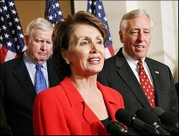Chaos out of the gate for Democratic majority in Congress
 by Charlotte Raab Sun Nov 19, 4:57 PM ET
by Charlotte Raab Sun Nov 19, 4:57 PM ET
WASHINGTON (AFP) - Infighting among US Democrats after their victory in the November 7 elections has led some to wonder if the party is up to the task of controlling Congress.
The first week of legislative work since the elections brought a personal defeat to incoming speaker of the House of Representatives, Nancy Pelosi, who will become the first woman to be number three in the constitutional line of succession -- behind the president and the vice president.
While trying unsuccessfully to impose a close ally as her right-hand man, she gave her followers reason to doubt her political skills.
"Nancy Pelosi has managed to severely scar her leadership even before taking up the gavel as the new speaker of the House," The New York Times commented in an editorial. "The new majority -- led by a presumably wiser speaker -- must realize by now that intramural vendetta is hardly a substitute for productive government."
In spite of the lack of clarity of their legislative agenda and the limited powers granted them the by the US Constitution, congressional Democrats have received a mandate from US voters.
An opinion poll published Thursday revealed that 51 percent of Americans are counting on Democrats to take the initiative in leading the country as opposed to 29 percent who expect it from
President George W. Bush' name=c1> SEARCHNews News Photos Images Web' name=c3> President George W. Bush.
With all eyes now on the upcoming 2008 presidential race, Democrats' ability to create a credible alternative to the Bush presidency will be crucial in convincing voters to allow them to take back the White House in two years.
For the moment, the Democrats, who will be sworn in in January, have two months to prepare for operating from the position of strength.
The problem, however, is that Democrats have campaigned throughout the country on the theme of change.
"They didn't have a detailed plan and they're now having to assemble one, and they have a small majority, so it's not like they can be very bold in what they propose," said Darrell West, professor at Brown University.
For the moment, new Democratic leaders confirmed only a handful of priorities they plan to pursue in the coming weeks: an increase in the minimum wage, a new energy policy that is less favorable to oil companies, and efforts to combat the greenhouse effect.
Bush has already indicated that he is open to raising the minimum wage as long as measures are taken to shield small businesses from the effects of the measure.
However, their more ambitious proposals risk bumping against a presidential veto or fall victim of internal divisions among the Democrats themselves who hold disparate political positions on various issues.
And their majority in the Senate will be particularly precarious: 51 Democrats versus 49 Republicans.
It also is counting on cooperation from people with a pronounced independent streak such as former Democrat Joseph Lieberman, who was re-elected with strong support from Republican voters, and a former Reagan administration official, Jim Webb.
Political scientist Larry Sabato from the University of Virginia has a simple piece of advice: "Narrow their focus, concentrate on just a few things and recognize that they're not going to be able to get much done until they have a Democratic president."





No comments:
Post a Comment